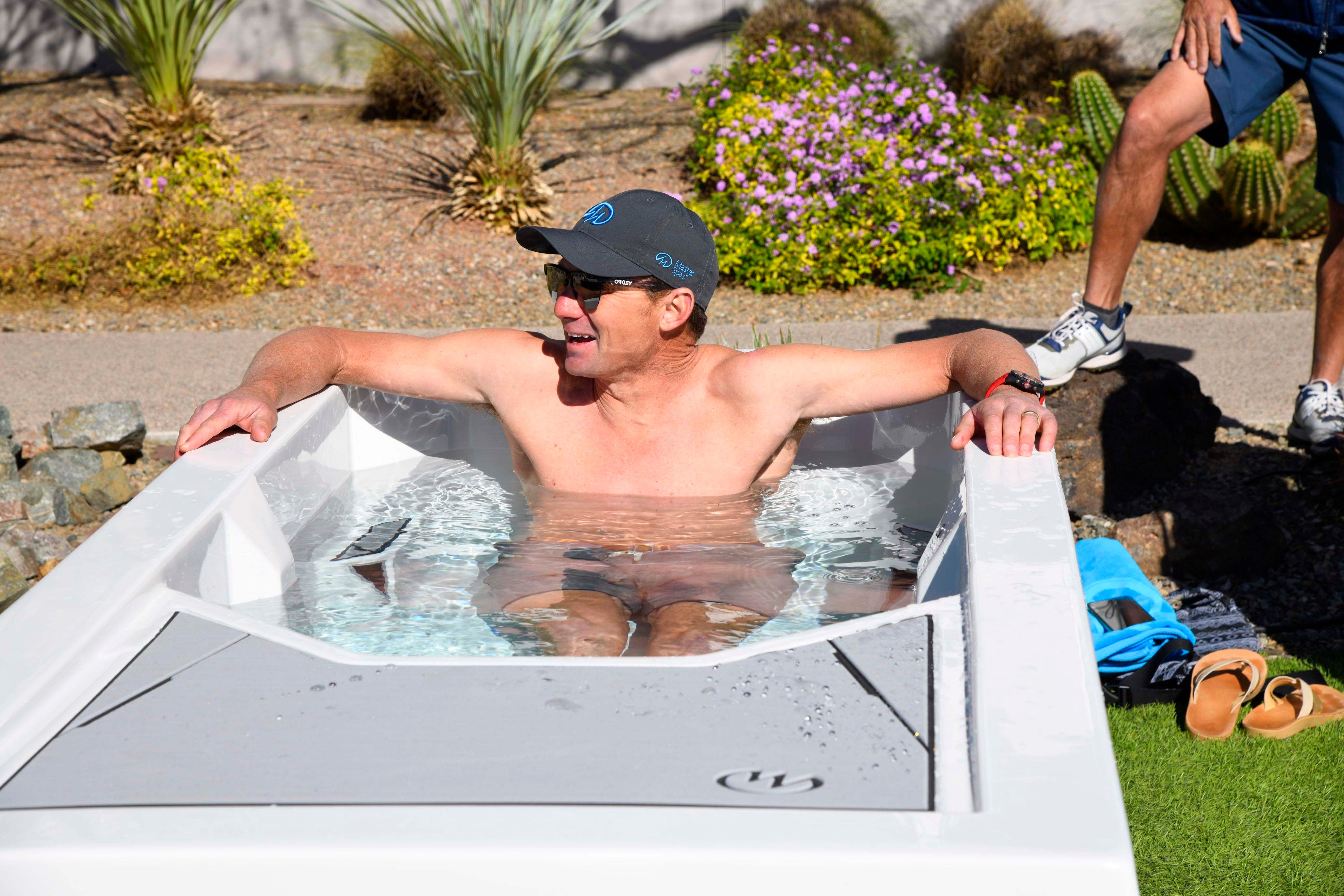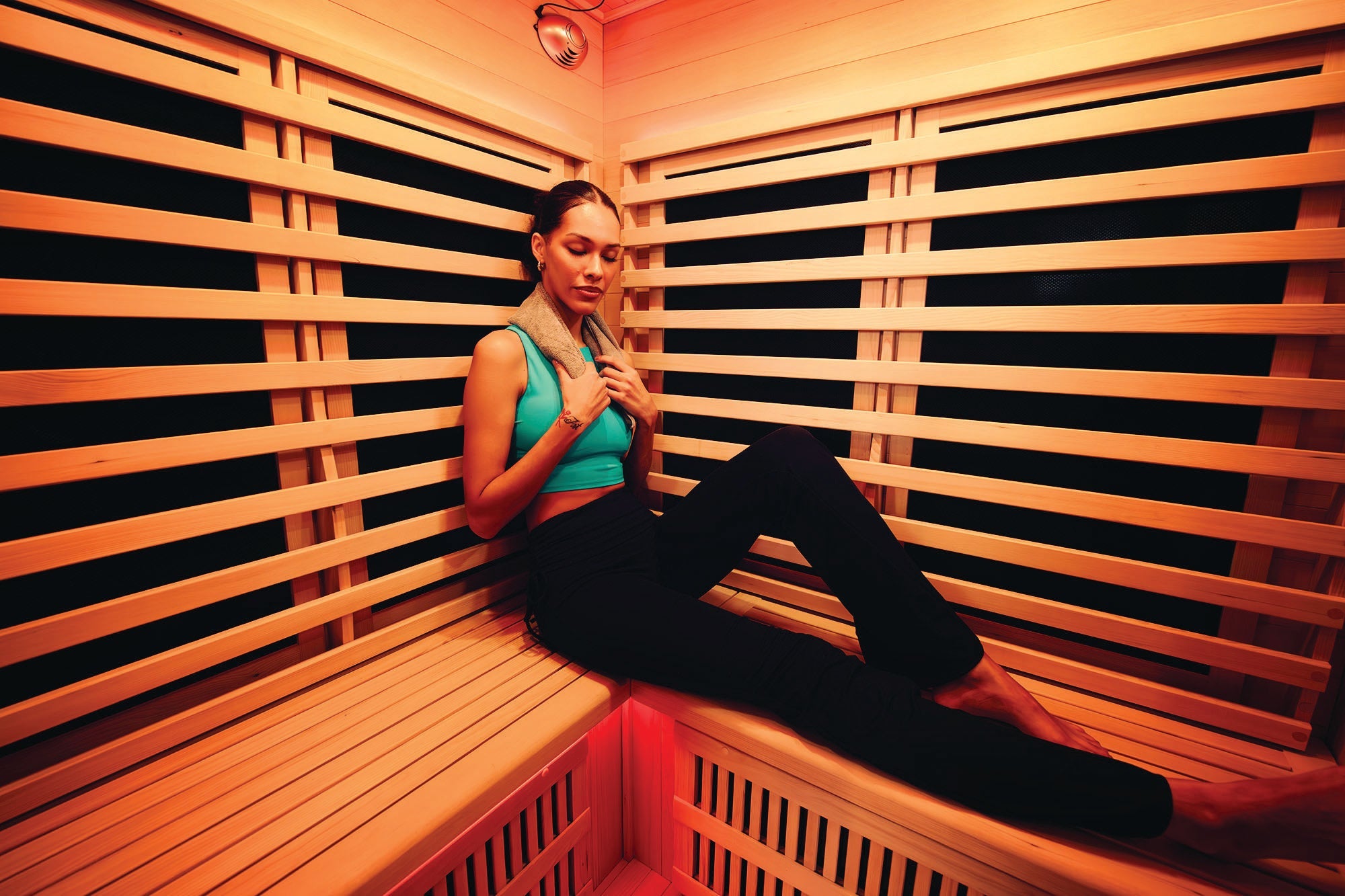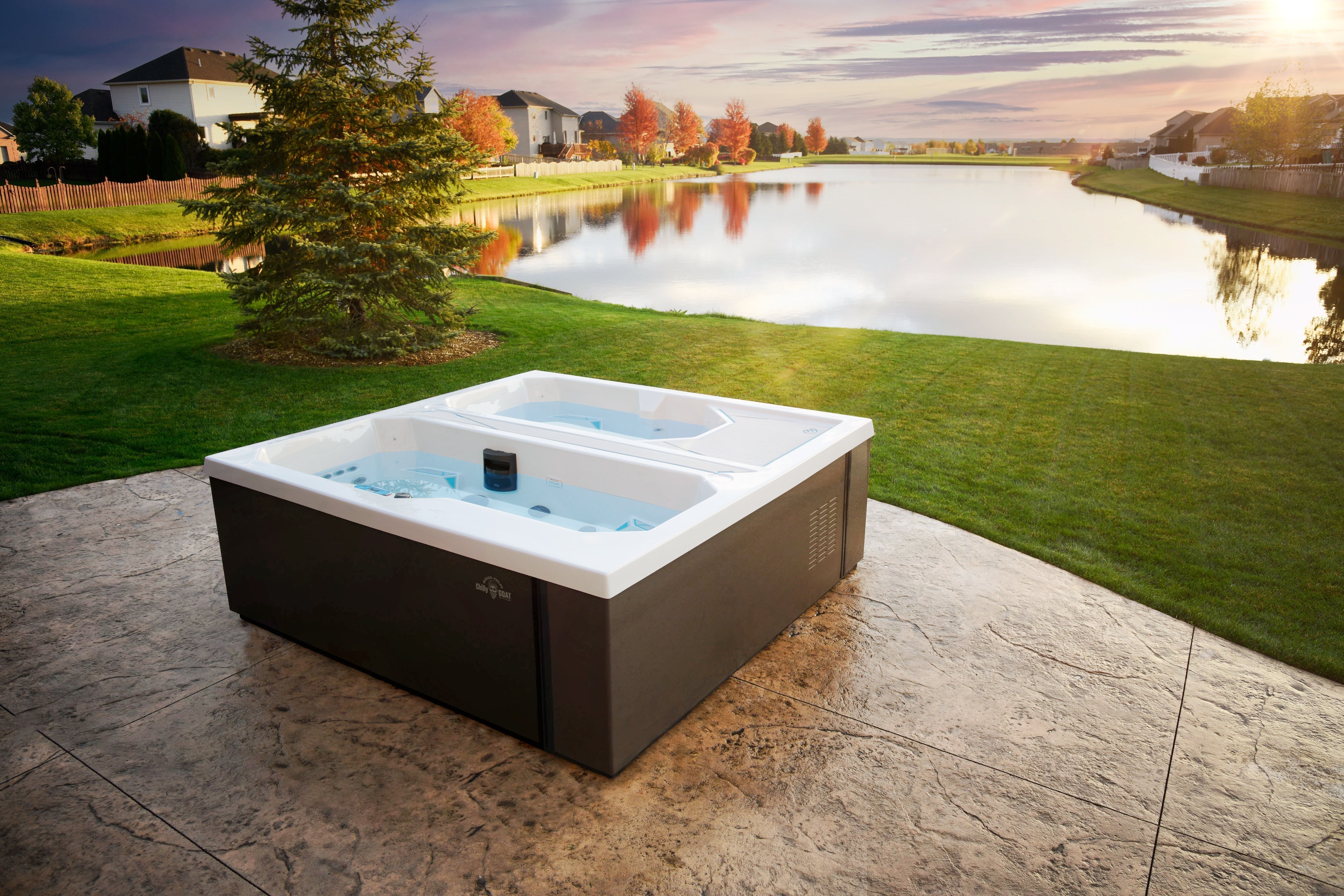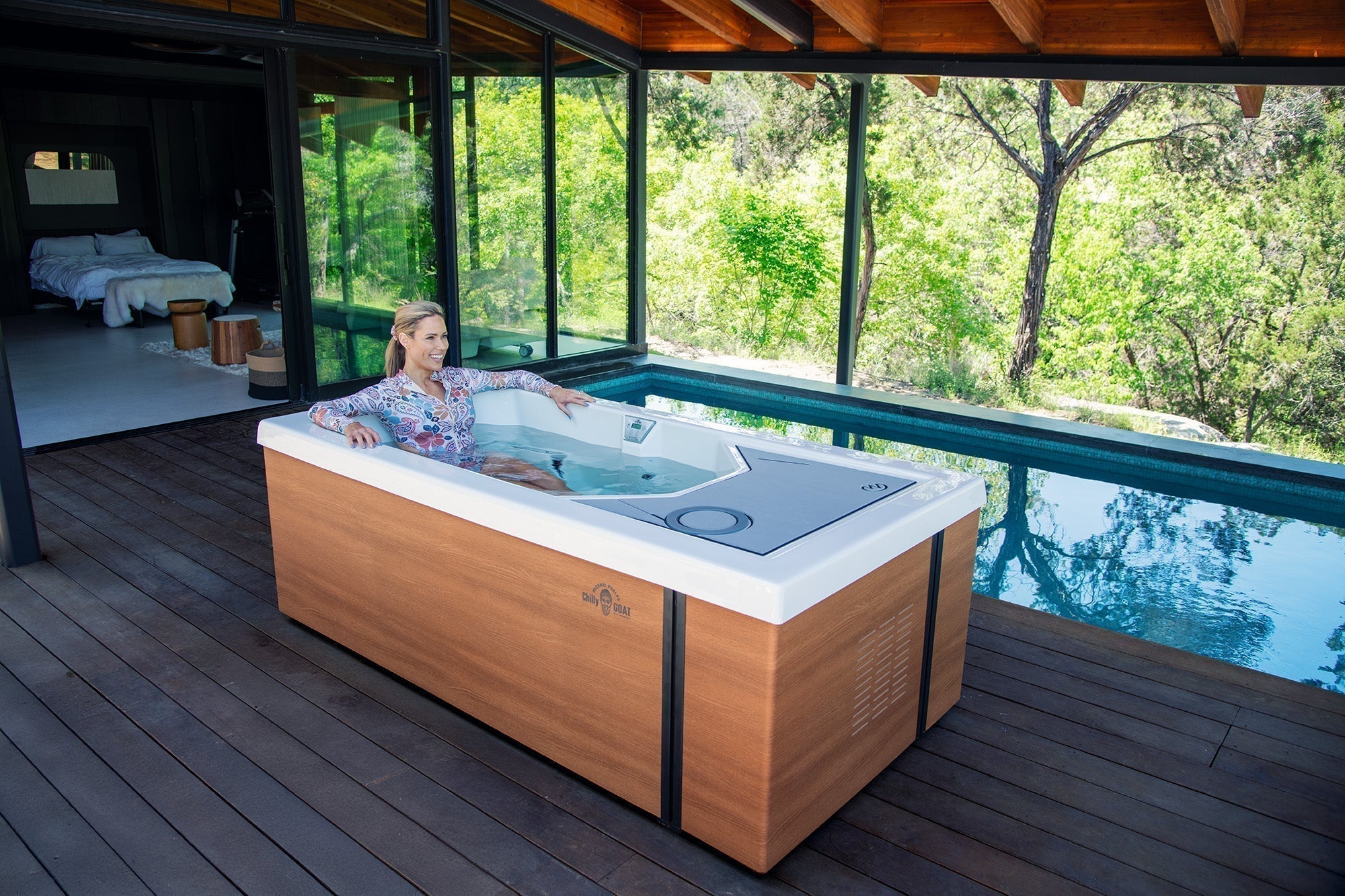Professional triathlete Ben Hoffman is accustomed to pushing his limits and embracing challenges. He’s tackled — and won — the iconic yet grueling Patagonman triathlon in Chile. He has raced as one of the best triathletes in the world in Kailua-Kona, Hawaii, during the IRONMAN World Championships.
“What really brings me reward and joy is to do hard things and that's what I really want,” Hoffman says, “because it feels real to me. You feel like you are living in the moment and accomplishing something.”
But you can’t race a full-distance event every day. Yet for the Colorado native, has embraced a cool way to break out of his comfort zone while taking his recovery session to the next level.
After he’s had his first coffee of the day but before he begins his training, Hoffman can be found plunging in his Michael Phelps Chilly GOAT Cold Tub.
“Cold water immersion sets the tone for the day,” he says. “I can say, ‘I've already done something kind of hard.’ You feel like you've accomplished something.”
We recently took the time to talk to Hoffman to learn how he first got started in cold water therapy, what his protocol looks like, and the benefits for triathletes.
Going with the flow
Ben Hoffman got his start in triathlon as a college student at the University of Montana. After graduation, he moved to Boulder, Colorado, to train and pursue his dreams of becoming a high level professional triathlete.
And it was there, with the Rocky Mountains as a backdrop, that he first dipped his toes into the recovery benefits of cold water.
“We would do these 18- to 20-mile long runs and then we would immediately get in the creek afterward,” he says.
The water in the creek was snow melt from the mountains, and “it was pretty excruciating.”
Reflecting on those cool down sessions, Hoffman says it probably wasn’t the best way to recover. Science now points out that it is better to give your body a chance to do its natural inflammatory response because that’s where you see progress.
“But from a mental standpoint, it was a cool challenge and I enjoyed sharing that experience with everybody else.”

Ben Hoffman’s cold therapy routine
A lot has changed since those early days in his career when he was running the trails in Boulder, Colorado.
Now a father of two living and training in Tucson, Arizona, Hoffman has to balance his sessions and recovery with his family life.
Waking up early, he starts his day with a cup of coffee and a session in his Chilly GOAT Cold Tub.
The Chilly GOAT is an iceless ice bath, so to speak. Hoffman just walks out to his patio, removes the cover, and hops in.
“I wasn't the person that was going to the store and buying ice bags and doing it on a regular basis,” Hoffman says. “So the Chilly GOAT has been great to have because it’s way more realistic to use it on a daily basis.
“I don’t have to worry about constantly cleaning something and maintaining it.”
The Chilly GOAT has a UV and filter system that helps keep the water clean. A premium 2.1-horsepower chiller keeps the water at Hoffman’s preferred temperature, which is about 47 degrees.
“When I first started using the Chilly GOAT, I kept the water pretty ‘warm’ — at like 50, 56 degrees.”
However, as he has adapted to the routine, he began dropping the temperature. Research suggests that you can see the benefits when the water is 60 degrees and colder.
The duration of a cold plunge can vary widely on the person and whether they are cold adapted. For Hoffman, the sweet spot is around eight minutes.
“I just get in, and the first two minutes are rough,” he says. “But then everything starts to get kind of numb and cold and then I'm pretty good.”

Embracing the mental challenge of cold water therapy
There’s a mind game to getting into cold water. It’s not something most of us want to do, and it’s something people can be quick to reject.
And when you finally take the plunge, it can be just as challenging to stay in.
For Hoffman, sessions in the Chilly GOAT are an “honest” experience — you have to be in the moment, even if it’s hard.
“I am just remembering that it’s actually what I want,” he says. The recovery, the performance, the mental edge.
And yet, he acknowledges, that it’s important to remember that the challenge and discomfort of cold water immersion will pass.
“I remind myself that I'll be warm again. And like, I'll be comfortable again,” he says.

Triathletes and the benefits of cold water
As Hoffman discusses the mental strategies he employs during those challenging initial minutes, he draws parallels to his approach to training and racing.
Triathletes face numerous challenges during races, and developing the ability to stay focused and composed under adverse conditions can be a valuable asset. You can draw on that mental toughness and grit that you build in the cold water sessions when you are out on the race course.
But a Chilly GOAT Cold Tub and cold water immersion provide added benefits to triathletes beyond building resilience and focus.
Cold water immersion is known to help reduce muscle soreness and inflammation, providing a natural form of recovery after intense training sessions. It also increases circulation, aiding in the delivery of oxygen and nutrients to muscles.
Dipping into chilly waters has another positive effect – it triggers the release of endorphins, those feel-good hormones that work wonders for your mood. In addition, the practice can be almost meditative, which is beneficial to your overall mental well-being.

How to buy a cold therapy tub
Do you want to enjoy the benefits of cold water therapy without buying bag after bag of ice? Having a Michael Phelps Chilly GOAT Cold Tub allows you to realize the impact of cold water. Enjoy clean, clear, cold water on demand. You can click here to find out more about the benefits of incorporating a Michael Phelps Chilly GOAT cold tub into your routine. Start your journey today!
Disclaimer: The information provided in this blog post is for informational purposes only and should not be considered as medical advice. Please consult with a healthcare professional before implementing any new practices or making changes to your diet or healthcare routine.




6 ways to boost your immunity this winter season
Chill like a pro: A blueprint for your Valaris ownership experience